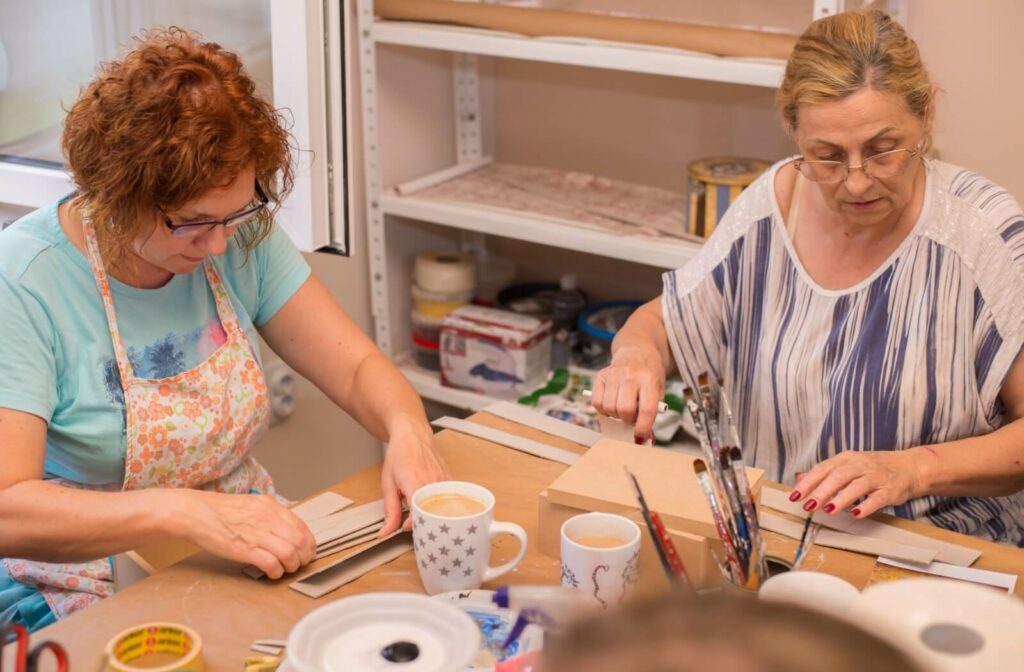When dementia is involved, meaningful moments make all the difference. They’re a chance to connect with your loved one and show them how much you value them. However, dementia sometimes affects more than just the brain and can create unique new challenges.
So, how can you spend time with your loved one in a way that feels rewarding for both of you? Art offers endless opportunities for expression and connection.
Art activities are an excellent option for older adults with dementia. There are various styles and materials you can use to adapt projects to your loved one’s abilities and interests.
Creating art can boost mood, support sensory engagement, and encourage personal expression. However, there’s another significant benefit: they’re fun for everybody involved.
How Art Activities Benefit the Mind
The benefits of art therapy go far beyond producing a painting or drawing. These projects stimulate different parts of the brain and encourage social connection.
When dementia is a factor, artistic pursuits can be highly engaging, providing sensory stimulation and nurturing a sense of purpose.
Simple art projects can help:
- Improve focus and concentration
- Reduce stress and anxiety
- Foster self-expression and creativity
- Strengthen fine motor skills
- Enhance problem-solving abilities
When your loved one participates in sensory activities like painting or sculpting, they’re able to express themselves without relying on words. These moments can be uplifting for both of you.
Simple Art Projects for People with Dementia
Creative projects don’t have to be complicated to be impactful. These activities are designed to be accessible, enjoyable, and beneficial for older adults with dementia.
Whether your loved one enjoys an art program in memory care or is exploring their creativity at home, the variety of potential projects means there are limitless possibilities to explore while you spend quality time together.
Create a Nature-Inspired Collage
Creating a collage encourages creative expression while using materials you likely already have. Collect magazines, printed nature images, and stickers to create a layered collage together. You might even include photos from past adventures, which can spark conversation.
Meanwhile, the tactile and repetitive act of cutting and gluing provides sensory stimulation that can be very soothing. You can also make this project easier with precut materials, including stickers or stick-on photo corners.
Design a Personalized Memory Box
A memory box is a wonderful way to preserve cherished moments. Start with a small wooden or cardboard box and decorate it with paint, photos, or meaningful mementos. You can even use the items inside as part of simple memory games, which help strengthen cognitive health.
Make Handprint Canvas Art
Using paint, create handprints on canvas or paper and decorate them together. The simple handprint project can include family members for a collaborative group piece, reinforcing connection and a sense of belonging. It’s a fun, colorful way to share time as a family.
Build Clay Sculptures
Working with clay is one of the easiest sensory art projects you can do together. Encourage your loved one to roll, shape, or mold clay into simple shapes. There’s no pressure to “finish” anything—the tactile experience alone supports creative expression and relaxation.
Paint with Watercolors
Painting with watercolors allows for freedom and exploration without worrying about mistakes. The soft colors and flowing textures can be calming and enjoyable.
Plus, painting projects are easy to adapt. Try thicker brushes to make it easier for older adults with arthritis or grip concerns. Your loved one can paint abstract shapes, simple patterns, or even favorite moments, all while building cognitive health through creativity.
The Value of Memory Care When Dementia Is Involved
When dementia is part of the picture, memory care can make a significant difference.
With Juniper Village at Paramus, we’ve designed a place where people can thrive, with evolving support that helps older adults with dementia and memory-related concerns embrace new possibilities. Memory care offers:
- Round-the-clock support from trained caregivers with experience in caring for dementia
- Structured daily routines to provide clarity and reduce confusion
- Safe and secure environments to prevent wandering and keep residents safe
- Engaging events tailored to cognitive abilities to help with mental stimulation
- Specialized therapies and programs aimed at preserving their quality of life
These all help your loved one maintain their dignity when dementia is involved.

Creative Hobbies in Memory Care: How They Benefit Community Members
Memory care isn’t just about professional support. In these communities, programming that nurtures personal expression is a part of daily life. Our community members often participate in group art activities, music therapy, or other creative projects that bring joy and connection.
These group sessions encourage friendships and give everyone a chance to express themselves in a welcoming environment. Safe spaces and personalized care plans allow each resident to participate in ways that feel comfortable.
The ongoing support helps older adults maintain cognitive health while making each day meaningful.
How Memory Care Can Help Your Family Connect
If you’re a caregiver, it can feel like you’re carrying everything on your own. That’s why memory care programs are such a valuable source of support. These communities integrate art therapy, social programming, and daily routines in ways that foster consistent engagement.
Your loved one deserves a place tailored to meet their unique needs. That place exists—it’s waiting for them here at Juniper Village at Paramus. In our community, we’re always organizing events like art therapy and other creative opportunities.
Schedule a visit with our team today to learn how we can help!







